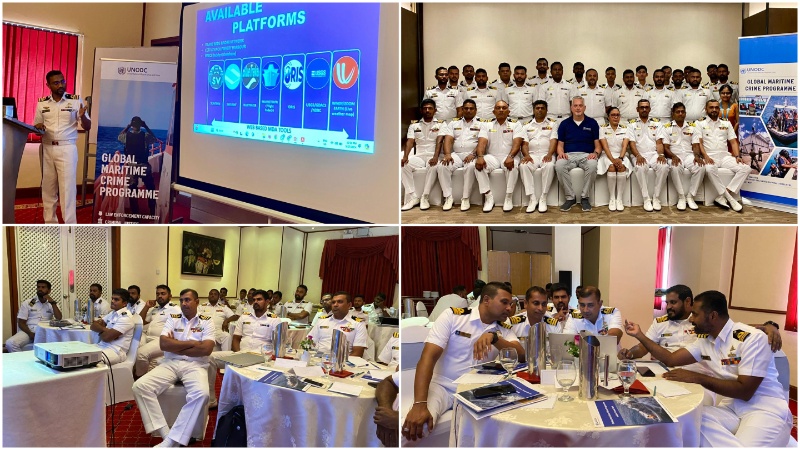Sri Lanka: Improving Interagency Coordination on Maritime Domain Awareness of National Maritime Law Enforcement Agencies

Colombo, Sri Lanka/29 May 2024: Despite the vital economic activity in the maritime domain—where 90% of world trade by volume occurs and 99% of the world’s telecommunication data travels through submarine cables—maritime issues often remain out of sight for many. This invisibility has turned the maritime space into a fertile ground for criminals who exploit these obscured waters to advance their illicit objectives, such as drug trafficking, illegal fishing, and pollution crimes in the marine environment, highlighting the urgent need for enhanced Maritime Domain Awareness (MDA).
Sri Lanka faces challenges in enhancing its Maritime Domain Awareness (MDA) due to its strategic location in the Indian Ocean, a major hub for international maritime traffic. The high volume of commercial and fishing vessels within Sri Lankan waters creates a complex environment for monitoring activities and identifying potential threats. Additionally, maritime crimes, particularly drug trafficking by sea, pose significant threats to the security and economic stability in Sri Lanka and South Asia, a region flanked by two major drug-producing countries. The use of fishing vessels to traffic drugs exploits vulnerabilities in maritime governance and enforcement. In light of the above, UNODC’s Global Maritime Crime Programme (GMCP) has embarked on a mission to bolster Sri Lanka’s MDA capabilities. Through a meticulously designed series of training programmes, UNODC GMCP has progressed from foundational to advanced levels, emphasizing interagency collaboration and communication to strengthen maritime law enforcement. These initiatives aim to equip Sri Lanka's maritime agencies with the skills and knowledge necessary to effectively address maritime threats and enhance overall maritime security.
On 16-17 May 2024, UNODC GMCP delivered a Maritime Domain Awareness Interagency Training and Tabletop Exercise, bringing together various Maritime Law Enforcement (MLE) agencies in Sri Lanka to promote inter-agency coordination frameworks . The exercise saw participation from the Sri Lanka Navy, Sri Lanka Coast Guard, Sri Lanka Customs, Sri Lanka Ports Authority, Ministry of Environment, Coastal Conservation and Coastal Resources Management Department, Attorney General’s Department, Ocean Affairs Division of Ministry of Foreign Affairs, Sri Lanka Police, Department of Fisheries and Aquatic Resources, Department of Immigration and Emigration, and Ministry of Ports, Shipping and Aviation. This collaborative effort aims to strengthen MDA capabilities across different agencies, promoting coordinated operational responses to potential maritime threats by sharing information. By focusing on the latest MDA techniques, technological advancements, and global best practices, the programme encourages a comprehensive understanding of maritime security issues and appropriate response in line with Sri Lanka’s capabilities and South Asian context. Through shared insights, experiences, and enhanced interagency cooperation, participants gained a deeper understanding of Sri Lanka's maritime domain.
Similarly, on 27-30 May 2024, UNODC GMCP continued this training series, delivering MDA Basic to Advanced training programmes to support officials from Sri Lanka Navy and Coast Guard in efficiently identifying, evaluating and responding to maritime information through difference case scenarios.
By continually enhancing MDA capabilities through comprehensive training and fostering robust interagency collaboration, UNODC GMCP significantly contributes to Sri Lanka’s maritime security landscape. The successful execution of these programmes underscores the importance of collective effort and shared expertise in tackling maritime crime.
These activities are delivered in Sri Lanka with generous funding from the people of Japan and contribute to SDG 16.